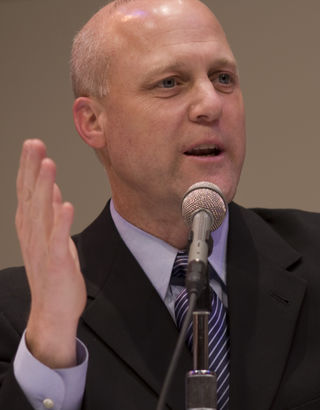Politics
Two Very Different Ways to 'Man Up' in American Politics
How a concern with honor controlled one politician and empowered another
Posted June 10, 2017
Greg Gianforte was, until recently, running for the U.S. House of Representatives for the state of Montana. I say “until recently” because he won that race last week. He now represents the people of Montana in Washington. No one is particularly surprised that he won. This Congressional race was not hotly contested. By all accounts, it should have been a runaway victory for Gianforte.

Despite running for Congress, Gianforte would not be known by most Americans if not for an incident that occurred just days before the Montana special election. This incident occurred right before an interview the candidate was about to give. Several Fox News reporters were in the room, along with a representative from BuzzFeed, when Guardian reporter Ben Jacobs entered the room and immediately began asking Gianforte questions about the healthcare plan proposed by Republicans. Jacobs stuck his phone near Gianforte’s face to record the candidate’s response.
According to Fox News reporter Alicia Acuna, who was in the room at the time, Gianforte at first declined to answer Jacobs’s questions, referring him to his press secretary. But when the reporter didn’t go away, Gianforte grabbed him by the neck, slammed him to the ground, and began to punch him in the face. The audio recording of the attack was all over the national news. This was, after all, a candidate for the U.S. Congress who physically attacked a reporter with what appears to be little to no provocation.
Ultra-conservative talk-radio host Laura Ingraham impugned the character of the victim of this attack on Twitter, not for having provoked Gianforte beyond reason, but for not fighting back against the candidate, suggesting that his failure to defend himself showed that he wasn’t a real man.
I don’t know what made Gianforte body-slam this reporter. His subsequent comments about the incident do not shed any real light on his state of mind or explain why he thought what he did was justified (it seems that the voters in Montana did not feel that his actions were totally unjustified, given that they still elected him to Congress). Without excusing his behavior, I would at least like to offer an explanation: Gianforte attacked this reporter because he was steeped in the masculine norms of a culture of honor.
Honor cultures exist all over the world, and their beliefs and values can be seen in the earliest narratives produced by human beings, from Gilgamesh to Homer's Iliad. Honor cultures put the defense of reputation at the center of social life, justifying (and even demanding) that men respond with physical aggression if they feel their honor has been threatened. Such an honor threat can occur through a provoking physical assault on their person, family, or property, or through an insulting remark or even an indirect action that calls into question their masculinity. Men in honor cultures are expected to uphold a high standard of toughness, bravery, and intolerance of disrespect. Women, in contrast, are primarily expected to uphold high standards of loyalty and sexual purity.
Social scientists have identified states throughout the American South and West as being more honor-oriented than states in the North. According to this division, which is supported by numerous studies, Montana is classified as an honor state. Ironically, Ingraham’s insulting rhetorical Tweet about what most men in Montana would do if body-slammed for no reason actually rings true. Research shows that white men who live in honor states are significantly more likely than their counterparts in non-honor states to respond to honor-related threats with physical aggression, leading to higher rates of argument-based homicides in honor states among white males. Similarly high rates of school shootings occur in honor states as well, arguably an honor-based response by young men to bullying or humiliation.
If you live in an honor culture, you can’t let someone mistreat you without an aggressive response. To do so is to lose your reputation, and in an honor culture, reputation is everything. Perhaps that concern with his own reputation was lurking in the back of his mind when Gianforte attacked the reporter, who he may have seen as somehow threatening his masculinity by continuing to ask the candidate questions after being rebuffed. Luckily for the both of them, the Guardian reporter did not appear to be similarly bound to the honor-ethic of retaliation. Who knows where the scuffle might have ended otherwise?
A Mayor’s Cultural Genius
New Orleans Mayor Mitch Landrieu has recently begun removal of the southern city’s Confederate monuments, many of which are in extremely prominent locations throughout the city. The latest monument to be removed was a statue of Confederate general Robert E. Lee, the fourth such memorial to fall in the span of under a month.

Following Lee’s toppling from the 80-foot pedestal where he had presided over the city for more than 130 years, Mayor Landrieu gave an impassioned speech explaining his reasons. Here are a few excerpts from his speech (which you can read in its entirety here):
“First erected over 166 years after the founding of our city and 19 years after the end of the Civil War, the monuments that we took down were meant to rebrand the history of our city and the ideals of a defeated Confederacy. It is self-evident that these men did not fight for the United States of America. They fought against it. They may have been warriors, but in this cause they were not patriots.
"These statues are not just stone and metal. They are not just innocent remembrances of a benign history. These monuments purposefully celebrate a fictional, sanitized Confederacy; ignoring the death, ignoring the enslavement and the terror that it actually stood for.
"After the Civil War, these statues were a part of that terrorism as much as a burning cross on someone’s lawn; they were erected purposefully to send a strong message to all who walked in their shadows about who was still in charge in this city.
"…Now, with these shocking words still ringing in your ears, I want to try to gently peel from your hands the grip on a false narrative of our history that I think weakens us. And make straight a wrong turn we made many years ago — so we can more closely connect with integrity to the founding principles of our nation and forge a clearer and straighter path toward a better city and a more perfect union.”
Mayor Landrieu, like Congressman Gianforte, lives in an honor-oriented state. But he appears to understand the forces underlying his honor culture and to be able to use those forces to persuade and lead. He uses the passions of honor to influence his community. The cultural change he is seeking in New Orleans is extraordinarily difficult. It will take an extraordinary type of influence to produce the change he seeks.

Look closely at Mayor Landrieu’s speech. See how he tries to redefine the Confederacy as anti-patriotic. Patriotism is a high value for honor-oriented people, so this redefinition is important. The Confederate soldiers were not patriots, he says, but terrorists. You don’t memorialize terrorists. You fight them, and you honor their victims. Notice, too, how Landrieu references weakness, which is one of the most taboo characteristics of all in an honor culture. Honor-oriented people flee from even the hint of weakness. You will do almost anything to avoid the stigma of weakness if you live in an honor culture, and Landrieu uses this stigma beautifully to encourage his listeners to flee from associating with the anti-patriotic Confederate cause. Furthermore, he implies that his listeners have been lied to and exploited through a false narrative of the Civil War. Rejecting this manipulative, false narrative brings freedom and integrity, also high principles to an honor-oriented people. In short, Landrieu’s speech is cultural genius.
The beliefs and values typical of honor cultures might seem antiquated and passé. They are, indeed, ancient in origin, but that is because the conditions that promote the rise of honor cultures have characterized most human societies throughout the history of our species. Thus, even if we feel these beliefs and values are outdated or obsolete, we should still be careful not to ignore them. The ideology of honor remains potent in many parts of the world today, and its influence remains even in contemporary America, capable of moving even politicians to think, feel, and behave in accordance with its strictures. Understanding the power of this cultural ideology can help to free us from its control and can give us the ability to harness its energy to motivate social change. And if you live in Montana, it might also get you elected to Congress.




